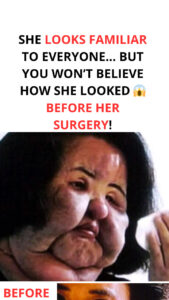In the world of celebrity and fame, beauty is often seen as currency — a requirement for survival, especially for women.
But what happens when the desire to maintain that beauty becomes an all-consuming obsession?
The story of Hang Mioku, a South Korean singer and former model, is a devastating example of how the pursuit of physical perfection can spiral into tragedy, disfigurement, and long-term psychological damage. Hang’s heartbreaking transformation shocked millions.
Once admired for her elegance and charm, she is now known as one of the most tragic cautionary tales about the dangers of cosmetic addiction and the deep psychological toll it can take.

From Aspiring Star to Beauty Tragedy. Born in South Korea in 1963, Hang Mioku was drawn to music and performance from a young age. She pursued a career as a pop singer and model, making a name for herself with her unique style, graceful appearance, and captivating voice. In a country where beauty standards are especially high — often prioritizing flawless skin, youthful features, and symmetry — Hang quickly became a symbol of allure and aspiration.
However, as the years passed, Hang found herself increasingly fixated on her looks. Like many in the entertainment industry, she felt pressure to maintain a youthful appearance. What began with harmless skincare routines soon escalated into regular cosmetic procedures, which she believed were essential to preserving her career and confidence.

The Slippery Slope of Cosmetic Enhancements
Initially, Hang underwent professional silicone injections and minor plastic surgeries while living abroad in Japan. These early procedures gave her the results she desired — smoother skin, fuller features — and fueled her desire for more. But as time went on, the changes began to distort her natural appearance. Her face swelled unnaturally, and the silicone began to accumulate in uneven and dangerous ways.
Eventually, doctors refused to continue treating her, warning that further injections could cause permanent damage. However, Hang was already deeply psychologically attached to the idea that more procedures would make her more beautiful. She ignored the warnings and decided to take drastic and dangerous measures on her own.
A Desperate Act: Injecting Vegetable Oil
When Hang could no longer receive medical-grade silicone, she made a devastating decision that would change her life forever. She began injecting herself at home using black-market substances — and eventually, vegetable cooking oil.
Yes, oil meant for frying food.
Lacking proper tools or knowledge, she continued to inject her face and neck regularly with oil, convinced that it would maintain or enhance her beauty. But instead of improving her appearance, her face began to swell grotesquely, becoming misshapen, lumpy, discolored, and ultimately unrecognizable. The skin took on a bluish-gray hue due to poor circulation, and her facial features became disfigured beyond repair.
The Turning Point: Family Horror and Mental Health Crisis
Hang eventually returned to South Korea, where her family was horrified at what they saw. Her parents could barely recognize her. Her once graceful face had become so bloated and distorted that she could not perform basic facial functions — even closing her mouth was a struggle.
Despite the physical damage, Hang remained convinced that she looked attractive. She reportedly stood in front of the mirror, admiring herself and denying that anything was wrong. At this point, it became clear to those around her that her struggle was not only physical — it was deeply psychological.
Hang confessed that she had heard voices telling her to inject her face, revealing symptoms of a serious mental illness, possibly body dysmorphic disorder (BDD) combined with delusional thinking. Eventually, she sought help and admitted herself to a psychiatric facility, marking the beginning of a long and painful road to recovery.
Public Sympathy and the Power of Media
Hang’s shocking condition became public knowledge after she was featured on a South Korean television documentary that aimed to raise awareness about the dangers of unregulated cosmetic procedures. Her story captured the hearts of viewers across the nation. The overwhelming response led to an outpouring of donations from the public, which allowed her to undergo multiple reconstructive surgeries.
Over the course of 10 complex operations, doctors carefully removed over 60 grams of silicone, oil, and infected tissue from her face and neck. Although it was impossible to restore her former appearance, the surgeries significantly reduced the swelling, helped manage her pain, and restored basic facial functions.
She could now speak and eat more easily and close her mouth — things that most people take for granted but had become difficult for Hang due to the swelling and scarring.
Living with the Aftermath
Now in her late 50s, Hang Mioku continues to live with the physical and emotional consequences of her past. Her appearance remains heavily scarred, and much of the damage is irreversible. She no longer works in the public eye and lives a quiet, private life, away from the fame that once seemed so important.
Despite this, Hang has chosen to speak openly about her experience, hoping to educate others and prevent similar tragedies. Her story has become a well-known case in South Korea, often cited in discussions around plastic surgery addiction, mental health, and the extreme beauty standards faced by women in the entertainment industry.
A Message to the World
Hang Mioku’s story is tragic, but it is not isolated. In countries like South Korea — where cosmetic surgery is widely accepted and even normalized — individuals are increasingly turning to procedures at younger ages. There is tremendous social pressure to conform to specific beauty ideals, which can take a heavy toll on self-esteem, especially for those in the public eye.
Her case has led to greater awareness of the psychological risks behind cosmetic obsession, as well as the need for mental health screening before surgery. Experts now emphasize that plastic surgery should never be used to “fix” deeper emotional issues or self-worth problems.
Hang Mioku’s journey is a reminder that the pursuit of perfection can quickly become a prison — and that beauty, when valued above all else, can destroy the very person trying to preserve it.
Conclusion: A Legacy of Awareness
What began as a quest to remain beautiful ended in disfigurement and mental health collapse. But through her honesty, Hang Mioku has created a powerful legacy — one of caution, education, and reflection.
She stands as a voice for those who feel trapped by appearance-based expectations and as a reminder that true self-worth can never be found in a mirror. Her life is no longer a story of vanity — but of resilience, recovery, and the power of self-acceptance.





